Table of Contents
- Understanding the Basics: Types of Natural Stone Countertops
- Granite Natural Stone Countertop FAQs
- Frequently Asked Questions About Quartz Countertops
- FAQs About Marble Countertops
- FAQs About Natural Stone Quartzite Countertops
- General Care and Maintenance Tips for Natural Stone Countertops
- Final Thoughts and Recommendations on Choosing the Right Countertop Material
Understanding the Basics: Types of Natural Stone Countertops
Welcome to our comprehensive guide on natural stone countertop FAQs. You likely have questions if you’re considering upgrading your kitchen or bathroom with natural stone countertops’ timeless elegance and durability. From understanding the differences between granite and marble to learning about maintenance and installation, this resource is designed to provide clear and concise answers to all your inquiries.
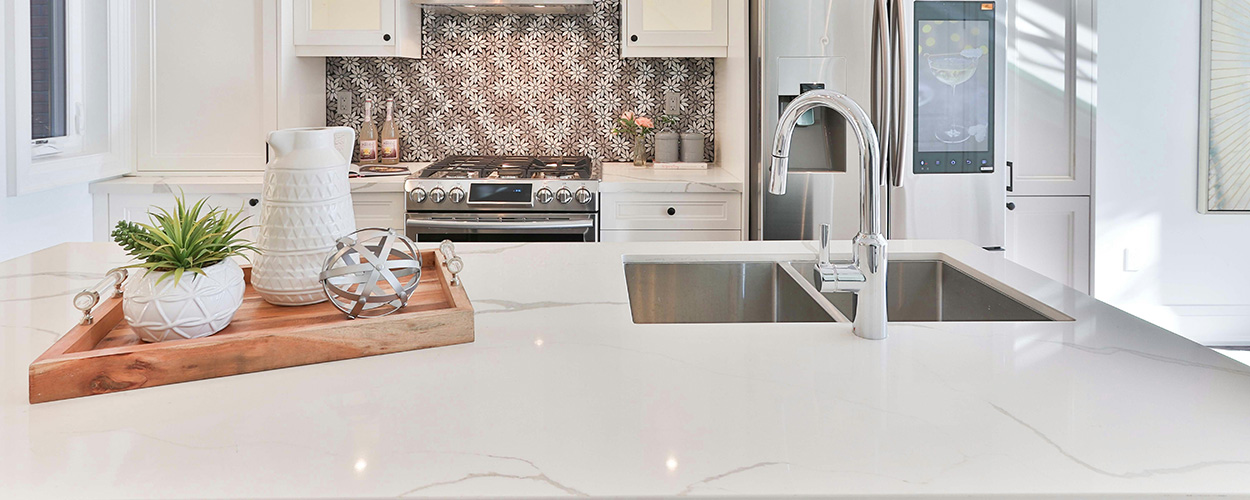
Whether you’re a seasoned homeowner or embarking on your first renovation project, we’re here to demystify the world of natural stone countertops and help you make informed decisions for your space. Explore our FAQs to discover everything you need to know about choosing, caring for, and enjoying the beauty of natural stone countertops in your home.
Granite Natural Stone Countertop FAQs
What is granite?
Granite is a natural stone formed from cooled magma or lava. It is composed mainly of quartz and feldspar with minor amounts of mica, amphiboles, and other minerals. This composition gives granite a rich variety of colors and patterns, making each slab unique. Granite countertops are known for their durability and resistance to heat, making them a popular choice for kitchen countertops.
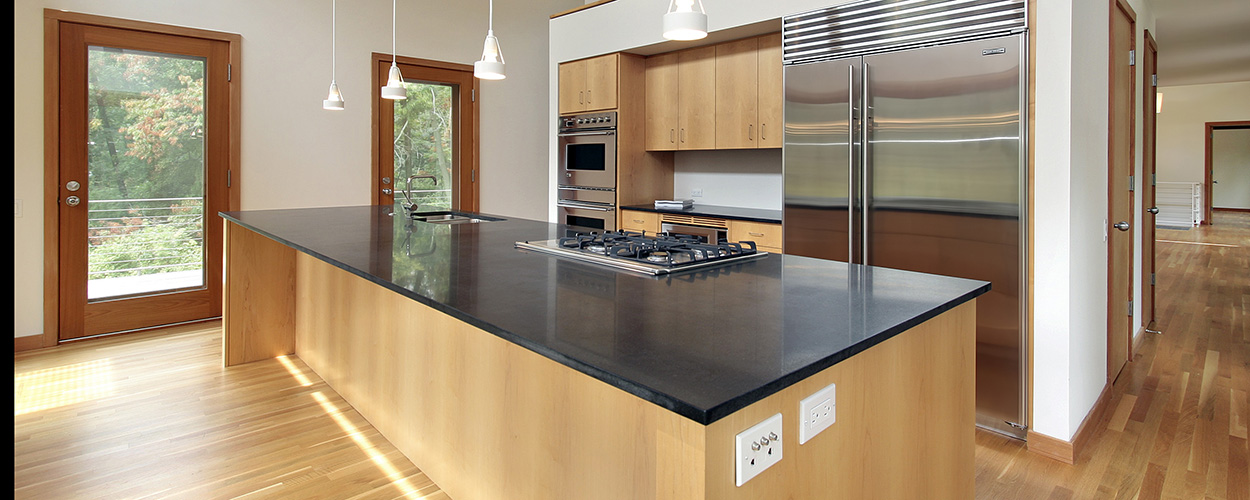
Why choose granite for countertops?
A Granite countertop offers a combination of beauty, durability, and longevity. It is highly resistant to scratches, heat, and wear, making it ideal for kitchens where cooking and meal preparation occur frequently. Granite’s unique patterns and colors also add a luxurious aesthetic to any space, with the added benefit that no two slabs are exactly alike, providing a unique look for your kitchen or bathroom.
Buying Guide: Denver Granite Countertops
Do Granite Countertops Require Excessive Maintenance?
Maintaining a granite countertop installation is relatively straightforward. Daily cleaning can be done with a soft cloth, mild detergent, or a cleaner specifically designed for a natural stone countertop. Although granite is resistant to stains, spills should be wiped up promptly, especially acidic substances like wine, coffee, and fruit juices. Use coasters under glasses and avoid placing hot pans directly on the surface to prevent potential discoloration. Sealing granite annually or as recommended can help prevent stains and protect the stone’s natural beauty.
6 Common Misunderstandings and Myths about Granite
Frequently Asked Questions About Quartz Countertops
What is quartz?
Quartz countertops are engineered stone surfaces made from a blend of natural quartz crystals and polymer resins, which bind the crystals together. This manufacturing process creates a highly durable and non-porous surface, available in various colors and patterns. Quartz mimics the look of natural stone but offers enhanced durability and maintenance ease.
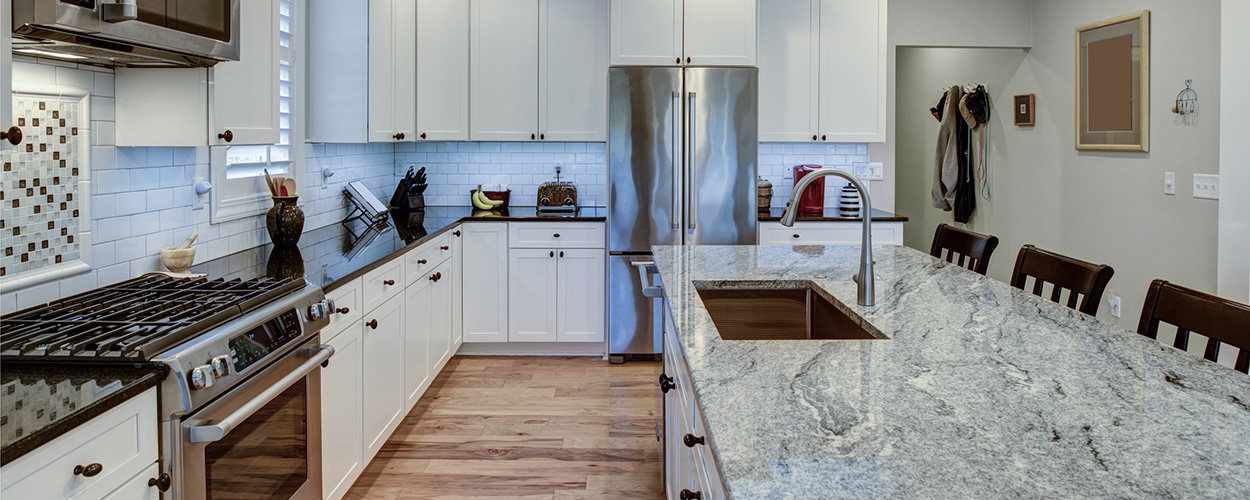
What are the benefits of quartz countertops?
A Quartz countertop offers several advantages:
- Durability: They are extremely hard and resistant to scratches, chips, and cracks.
- Non-porous: Unlike natural stones, quartz is non-porous, making it highly resistant to staining and eliminating the need for sealing.
- Maintenance: Easy to care for, requiring only soap and water for cleaning. Its non-porous nature also makes it more hygienic, as it does not harbor bacteria or viruses.
- Aesthetic Variety: Available in a wide range of colors and patterns, quartz can mimic the appearance of natural stone, such as granite and marble, or offer unique designs not found in natural materials.
Benefits of Quartz Countertops in Denver’s Climate
How do I care for quartz?
Caring for quartz countertops is simple:
- Clean up spills immediately to prevent any potential damage.
- Use a soft cloth or sponge, mild soap, and water for daily cleaning.
- Avoid using harsh chemicals, abrasive cleaners, or scouring pads, which can dull the surface.
- Although it is heat resistant, it’s advisable to use trivets or hot pads under hot pans or cooking units to prevent heat damage.
- Avoid exposing the countertops to direct sunlight for prolonged periods, as UV light can cause discoloration over time.
Tips to Clean and Maintain Your Quartz Countertops in Denver
FAQs About Marble Countertops
What makes marble a popular choice?
Marble is renowned for its timeless beauty. Its classic veining and soft, subtle palette add elegance and sophistication to any space. Marble is trendy in bathrooms and kitchens for countertops, flooring, and backsplashes. The unique patterns and natural variations in marble mean that no two slabs are identical, offering distinct luxury and individuality.
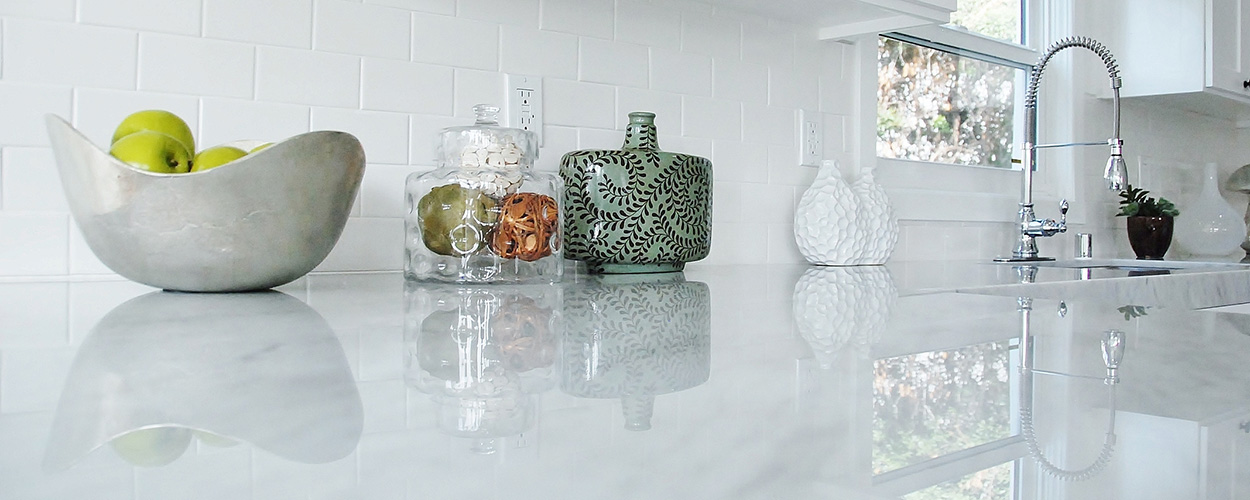
What are the care considerations for marble countertops?
Marble is a softer and more porous stone than granite and quartz, making it more susceptible to scratching, staining, and etching from acidic substances. Care considerations include:
- Sealing marble countertops regularly to help prevent stains.
- To prevent etching, clean up spills immediately, especially acidic substances like lemon juice, wine, and vinegar.
- Use coasters under glasses and place hot items on trivets or mats to avoid scratches and heat damage.
- Clean with a soft cloth and mild cleaner designed for marble or gentle dish soap diluted in water.
How does it react to stains and etching?
Marble’s porous nature means it can absorb liquids, leading to stains if spills are not cleaned promptly. Etching occurs when acidic substances come into contact with the marble, reacting with the calcium carbonate in the stone and leaving a dull mark on the surface. While sealing can help prevent staining, it does not stop etching. Avoid contact with acidic substances to minimize etching and consider honed or leathered finishes, which can help disguise etching better than polished surfaces.
How to Clean and Care for Marble Countertops in Denver
FAQs About Natural Stone Quartzite Countertops
What is quartzite, and how does it differ from quartz?
Quartzite is a powerful and durable natural stone that originates as sandstone and transforms under intense heat and pressure into quartzite. Its composition primarily consists of quartz, which gives it a hard surface. Quartzite should not be confused with quartz, an engineered product from natural quartz and resin binders. Quartzite offers a look similar to marble but with durability and hardness closer to granite.
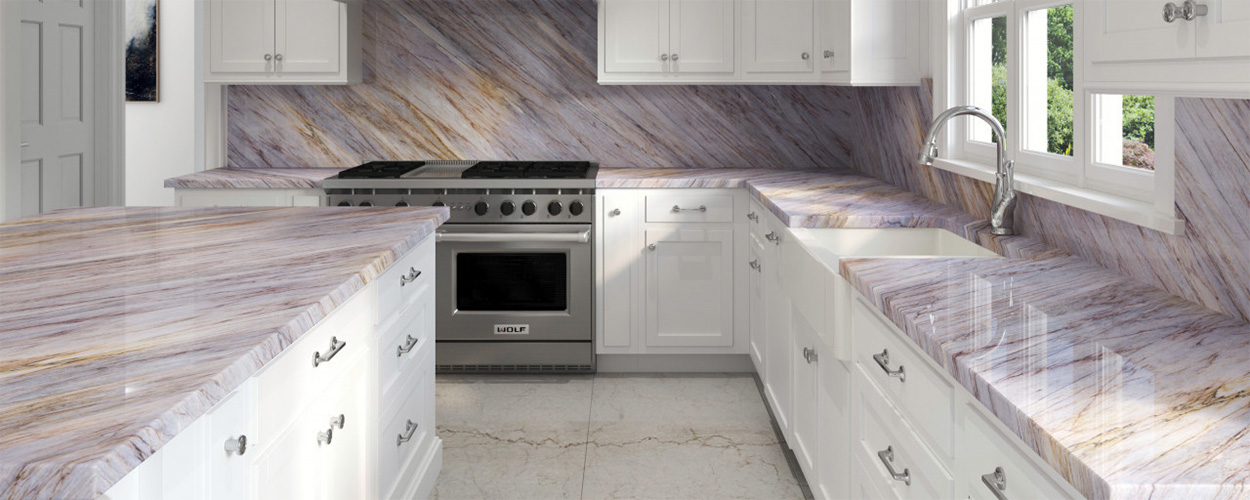
What are the durability and maintenance requirements of quartzite?
Quartzite countertops are known for their durability and resistance to heat and scratches. They are more resistant to heat and scratches than marble but still require some care to maintain their natural beauty. Quartzite, a natural stone, is porous, so it must be sealed regularly to prevent stains from penetrating the surface. Cleaning is similar to other natural stones, requiring only mild soap and water or a stone cleaner.
Can quartzite resist heat and staining?
Yes, quartzite has excellent heat resistance, making it safe to place hot pans directly on the surface without damage. However, like all natural stone, it can be prone to staining if not properly sealed. It’s important to reapply sealant periodically, depending on the usage and the type of quartzite, to maintain its resistance. Promptly cleaning spills, especially of acidic or highly pigmented liquids, is also essential an essential prevention.
General Care and Maintenance Tips for Natural Stone Countertops
Daily Cleaning
- Use a soft cloth or sponge with warm water and mild dish soap for daily cleaning. Avoid harsh chemicals and abrasive cleaners, which can damage the stone’s surface.
- For stubborn stains, use a stone-specific cleaner recommended by your countertop supplier.
Preventing Stains and Etches
- Wipe up spills immediately, especially acidic substances like wine, coffee, lemon juice, and tomato sauce, which can etch the surface of softer stones like marble.
- Use coasters under all glasses, especially those containing alcohol or citrus juices, to prevent etching and staining.
Heat Protection
- Although natural stones like granite and quartzite are heat resistant, it is wise to use trivets or hot pads under pots, pans, and other hot items to prevent potential damage.
Scratch Avoidance
- Use cutting boards instead of cutting directly on the countertop to prevent scratches.
- Avoid dragging heavy pots, pans, or appliances across the surface to prevent scratching.
Sealing
- Seal natural stone periodically to protect them from staining. The frequency depends on the stone’s porosity and the sealer used. Consult with your fabricator for specific recommendations.
- Drip water on the surface of your countertop to test its seal; if it beads up, the seal is effective. If the water soaks in, it’s time to reseal.
Avoiding Harsh Chemicals
- Do not use cleaners that contain vinegar, lemon juice, or other acids..
- Avoid using bleach, ammonia, or other harsh cleaning agents, as these can etch or dull the surface of your natural stone.
By following these general care and maintenance tips, you can help ensure your natural stone remains beautiful and durable for years.
Final Thoughts and Recommendations on Choosing the Right Countertop Material
When selecting a countertop material for your kitchen or bathroom, it’s important to consider your lifestyle, budget, and aesthetic preferences. Each natural stone has unique qualities and care requirements, so choosing the right one depends on what matters most to you regarding durability, maintenance, and appearance.
- Granite is an excellent choice for those who appreciate the beauty of natural stone and seek a durable, heat-resistant surface. It requires periodic sealing to maintain its resistance to stains.
- Quartz offers a more uniform look and is ideal for those who prefer a low-maintenance countertop. It’s non-porous, making it highly resistant to staining and not requiring sealing.
- Marble is best suited for those who value elegance and are willing to try to maintain its beauty. It’s more susceptible to etching and staining, demanding careful use and regular sealing.
- Quartzite provides a good compromise between marble’s beauty and granite’s durability. It offers substantial resistance to heat and scratches but requires sealing to prevent stains.
Care and Maintenance
Regardless of the material you choose, proper care and maintenance are key to preserving the beauty and longevity of your countertop. This includes using the right cleaning methods, avoiding harsh chemicals, protecting the surface from heat and scratches, and sealing the stone as needed.
Budget Considerations
The cost of natural stone countertops can vary widely, depending on the installation’s material, color, and complexity. Quartz tends to be on the higher end, closely followed by granite, quartzite, and marble. When deciding, consider your budget and the long-term value the countertop will bring to your home.
Aesthetic and Design Preferences
Finally, consider the look and feel you want to achieve in your space. Each stone offers a unique palette of colors, patterns, and finishes, allowing you to customize your counters to match your design vision.
By weighing these factors—durability, maintenance, cost, and aesthetics—you can select the countertop material that best fits your needs and lifestyle, ensuring a beautiful and functional space for years to come.

